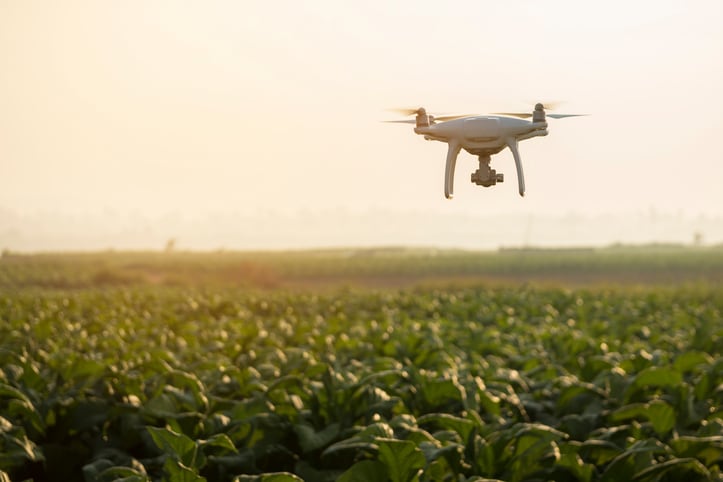“No other ag-tech solution today enables automated scouting of fields,” CEO and co-founder of Taranis Ofir Schlam told FoodNavigator-LATAM.
Founded in 2015 by Ofir Schlam, Assaf Horowitz, Eli Bukchin and Ayal Karmi, Taranis offers farmers an artificial intelligence (AI)-driven crop monitoring system.
It uses satellites, planes, and drones to take images of fields twice a week in-season (the drones take photographs at “leaf-level”, it says) while AI technology identifies crop health problems through image-recognition algorithms and disease prediction models.
The precise imagery - 0.3mm per pixel – also allows it to analyze and identify specific weeds, insects, and diseases with greater accuracy, while weather forecasting and analytics on plant growth cycles can calculate plant biomass, chlorophyll content levels, and ground temperature.
Farmers can choose to visualize the data with maps, reports, graphs, and written insights, and data is stored from year to year, allowing historic comparisons over an eight-year period.
'We oversee millions of hectares in Latam'
The software is currently being used on millions of hectares of farmland in Brazil, Argentina, Paraguay, Uruguay, Columbia, Peru, and Chile for crops including corn, soybean, cotton, wheat, potato, and sugar.
Schlam said: “As agricultural lands are shrinking and limited natural resources are being depleted, farmers face more challenges than ever. In Latin America, for instance, farmers are dealing with severe crop loss due to disease and pests, lack of time and resources to manage large acres of land, and labor shortages in the farming sector."
Taranis says it can assist farmers by providing advance warning for pests, fertilizer deficiencies, and planting problems, and promises higher yields, protected crops and cost savings.
Specifically, the Tel Aviv-headquartered firm says farmers using its product can boost their crop yields by 2 to 8% and reduce inputs by 10 to 20%, translating to a four-fold average return-on-investment (ROI).
“[The farmers] are amazed at a picture of a beetle chewing on a leaf and ask, ‘Wait a second, was that taken from a plane?’ They then call all their staff to come over and take a look.”
Ofir Schlam
INTA collaboration
Schlam said it is open to exploring “all models of reaching and supporting the farmer”.
To this end, it also works with retailers, consultants, co-ops, ethanol mills, chemical and seed companies and even banks, insurance companies, governments and research entities.
“We welcome any relationship with agribusiness related companies,” he added.
It is working with Argentina’s National Institute of Agriculture Technology (INTA), for example, for wheat, soy, and corn.
“INTA uses Taranis for its own research and development (R&D) plot tracking management, which validates our program and return-on-investment measurement system, making farmers more confident in the type of service we provide.”
The company has also attracted investors' attention, and has raised over USD$30 million from venture capitalist investors, including Viola Ventures, Sumitomo Corporation Europe and Nutrien for series B funding and Vertex Ventures and Finistere Ventures in series A.
But is it really a sustainable solution for future agriculture if it involves flying planes over thousands of hectares of concessions in order to photograph each inch of the field?
Schlam believes so. “We believe our impact on the environment to be quite negligible as our practices using light aircraft and drones are exceptionally efficient. Our findings enable a much more effective use of inputs at the right time, so, from a sustainability standpoint, Taranis is very positive.
“At the same time, our system allows farmers to be more profitable which is our main focus,” he added.

